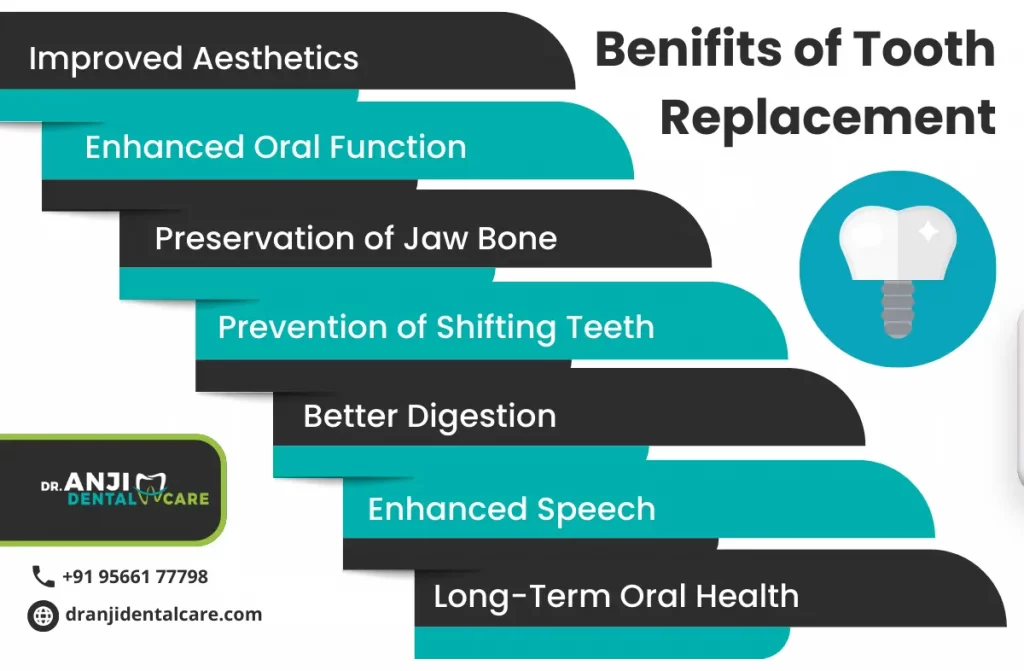A Guide to Different Tooth Replacement Options
Different tooth replacement options tooth loss can occur for various reasons, including decay, gum disease, injury, or aging.
Contents
Different tooth replacement options tooth loss can occur for various reasons, including decay, gum disease, injury, or aging. Whatever the cause, the consequences can impact your oral health and overall well-being. Fortunately, advances in dental technology have given rise to several effective tooth replacement options.
When considering different tooth replacement options, it’s important to consult with your dentist to determine the best solution for your unique situation. Factors such as the number of missing teeth, your overall oral health, and budget will influence your choice.

In this Guide, we’ll Delve into Four Different Tooth Replacement Options:
- Dental Bridges
- Dental Implants
- Partial Dentures
- Full Dentures
Each of these options has its own set of advantages and drawbacks, so let’s explore them further.
Dental Bridges
Dental bridge vs implant: One common comparison people make when considering different tooth replacement options is the choice between a dental bridge and a dental implant.
A dental bridge is a non-removable appliance that consists of an artificial tooth (pontic) anchored between two crowns, which are placed on the adjacent healthy teeth. Bridges are an excellent choice when you have healthy, strong teeth on either side of the gap.
Pros of Dental Bridges:
- Savvy: Dental extensions are in many cases more reasonable than dental inserts.
- Quick procedure: The process of getting a dental bridge usually requires fewer visits to the dentist compared to implants.
- Restored functionality: Bridges can improve your ability to speak and eat properly.
Cons of Dental Bridges:
- May require healthy tooth modification: The adjacent teeth need to be filed down to accommodate the crowns, which may weaken them.
- Limited lifespan: Dental bridges typically need replacement every 10 to 15 years.
- Cleaning challenges: Cleaning under the bridge can be challenging and may require special flossing tools.
Dental Implants
Dental bridge vs implant: Dental implants are often considered as an alternative to dental bridges.
Dental implants are a popular choice for those who want a more permanent and natural-looking solution. They consist of a titanium post that is surgically implanted into the jawbone to replace the tooth root
Pros of Dental Implants:
- Life span: Dental inserts can endure forever if appropriately focused on.
- Preserve adjacent teeth: Implants don’t require the alteration of adjacent teeth, which can help maintain their strength.
- Natural appearance and function: Implants look and function like real teeth, providing a comfortable and aesthetic solution.
Cons of Dental Implants:
- Higher cost: Dental implants are typically more expensive than bridges or dentures.
- Surgical procedure: The implant placement involves surgery, which may not be suitable for everyone.
- Healing time: It can take several months for the implant to fuse with the jawbone before the crown can be attached.
Partial Dentures
If you’re missing multiple teeth but not a full set, partial dentures might be the right choice among different tooth replacement options. Partial dentures are removable appliances that consist of artificial teeth attached to a base that matches the color of your gums. They are held in place with clasps or precision attachments.
Pros of Partial Dentures:
- Cost-effective: Partial dentures are typically more affordable than bridges or implants.
- Non-invasive: There’s no need for surgery or extensive dental work.
- Versatile: They can replace multiple missing teeth in various locations in the mouth.
Cons of Partial Dentures:
- Less stable: Partial dentures may not provide the same level of stability as dental bridges or implants.
- Removable: Some people find the idea of removable dentures inconvenient or uncomfortable.
- Potential discomfort: Dentures may cause gum irritation or sore spots until you get used to wearing them.
Full Dentures
Full dentures are a comprehensive solution for those who have lost all their natural teeth. They consist of a complete set of artificial teeth set in a gum-colored acrylic base. Full dentures can be either conventional (placed after the gums have healed) or immediate (placed immediately after tooth extraction).
Pros of Full Dentures:
- Affordability: Full dentures are often more budget-friendly than other tooth replacement options.
- Restore appearance: Dentures can improve facial appearance by supporting the lips and cheeks.
- Quick solution: Immediate dentures can be placed right after tooth extraction, so you won’t be without teeth.
Cons of Full Dentures:
- Stability: Dentures may not provide the same stability as dental implants or bridges.
- Learning curve: Adjusting to full dentures may take time, and some people experience difficulties with speaking and eating initially.
- Maintenance: Dentures require regular cleaning and maintenance to prevent problems like bad breath and fungal infections
Conclusion
In the world of dentistry, there are different tooth replacement options to suit a variety of needs and preferences. Whether you opt for a dental bridge, dental implant, partial denture, or full denture, the right choice will depend on factors such as your oral health, budget, and personal comfort.
Frequently Asked Questions
Are dental implants suitable for everyone?
No, dental implants require sufficient jawbone density for successful placement. Your dentist will assess your bone structure to determine if implants are a viable option.
How long do dental bridges last?
Dental bridges typically last 10 to 15 years with proper care. Regular dental check-ups and oral hygiene are essential for their longevity.
Can I eat normally with dentures?
Yes, you can eat normally with dentures, but it may take some time to adjust to them. Start with soft foods and gradually transition to a regular diet while taking care to chew evenly on both sides.






























